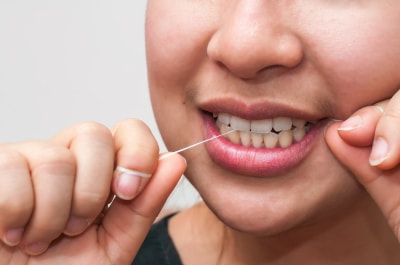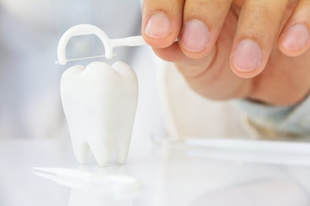 We know regular brushing is a very important part of dental care and hygiene, but flossing is a crucial part as well. The American Dental Association has always emphasized the importance of cleaning in between the teeth, however, many parents overlook this oral practice to their kids and even themselves. Flossing in between the teeth can remove trapped food particles that your toothbrush can’t reach. It also helps remove plaque buildup. There are two things commonly used today – the traditional dental floss and the floss pick. Both types have a thin filament of fiber that is coated in wax, so it could slide easier between the teeth. But which one is more effective? Looking at the two floss types – is there really a difference? Dental Floss vs. Floss Picks Dental floss has been used for many decades than floss picks. It is effective at getting rid of food residues between the teeth that toothbrush bristles cannot penetrate. Bacteria inside the mouth produce lactic acid, which causes plaque buildup. Plaque is a biofilm containing different types of bacteria. The lactic acid from bacteria demineralizes the enamel, which leads to dental cavities. Regular flossing can prevent the buildup of plaque. In addition, flossing helps prevent gum disease. Many flosses contain anti-coagulant for people who have mild gingivitis or gum disease to prevent any form of bleeding.  On the other hand, floss picks are disposable pieces of plastic with a tiny floss on the ends. Many people use them over traditional string floss. They are easy to use, particularly when reaching molars at the back of the mouth. Floss picks are also good in removing bacteria and food. Numerous studies have been done to compare the effectiveness of dental floss and floss picks. Most of the results found that both are effective when used properly and regularly. In a study checking their effect on the gums, researchers have shown the both have equally reduced plaque scores, which means that there’s no significant difference between the two. Which One Works Best For You So far, nearly all the research done has concluded that there’s no huge difference in the effectiveness between a dental floss and floss picks. This means that what is more important is that you floss at all rather than skipping flossing. Some people prefer floss picks while other choose the old dental floss. Flossing every day can make a great difference in your oral health and prevents plaque build-up that can damage your enamel.  Until now, more and more evidence continue to surface regarding the health concerns linked with unhealthy weight and obesity among children and adults. More often, the focus is on the diseases in the body but recent studies revealed its effect on oral health, specifically the gums. Based on a study, obesity can affect kids’ oral health in two ways: First one, obesity highly affects a child’s diet – what they eat and how often they eat. This leads to a higher risk of dental carries and/or cavities. Due to their greater preference for foods high in carbohydrates and sugar, the risk of developing plaque is much greater. Second, obesity is often associated with an increase in gingival disease. Studies have found that the more overweight a person is, the greater their risk of having gum disease. This could also be due to their diet and the foods they mostly consume. Prevalence of Gum Disease In the US, more than 3 million people experience gum disease every year and this figure consistently increases. Gum disease refers to an infection of the tissues that surround the teeth, known as the gums. But gum disease can be prevented, regardless of your weight. At the early stages of gum disease, the damage can be reversed. But once it progresses into a severe level of infection, the damage becomes a lifetime. Such stage is called periodontitis. When this infection emerge, the gums tend to pull away from the teeth. If left ignored, the damage can reach into the bones and supportive tissues of the mouth, leading to a more serious condition, including tooth loss. One of the biggest factors of having gum disease is poor dental hygiene. Because dental plaque develops on the teeth, it could turn into tartar. Tartar cannot be removed through regular brushing and requires professional dental cleaning. Hence, it is important not to miss dental appointments. |
AuthorMint Kids Dentistry Archives
July 2021
Categories |
Location |
|
Sitemap
|
Forms
|

 RSS Feed
RSS Feed